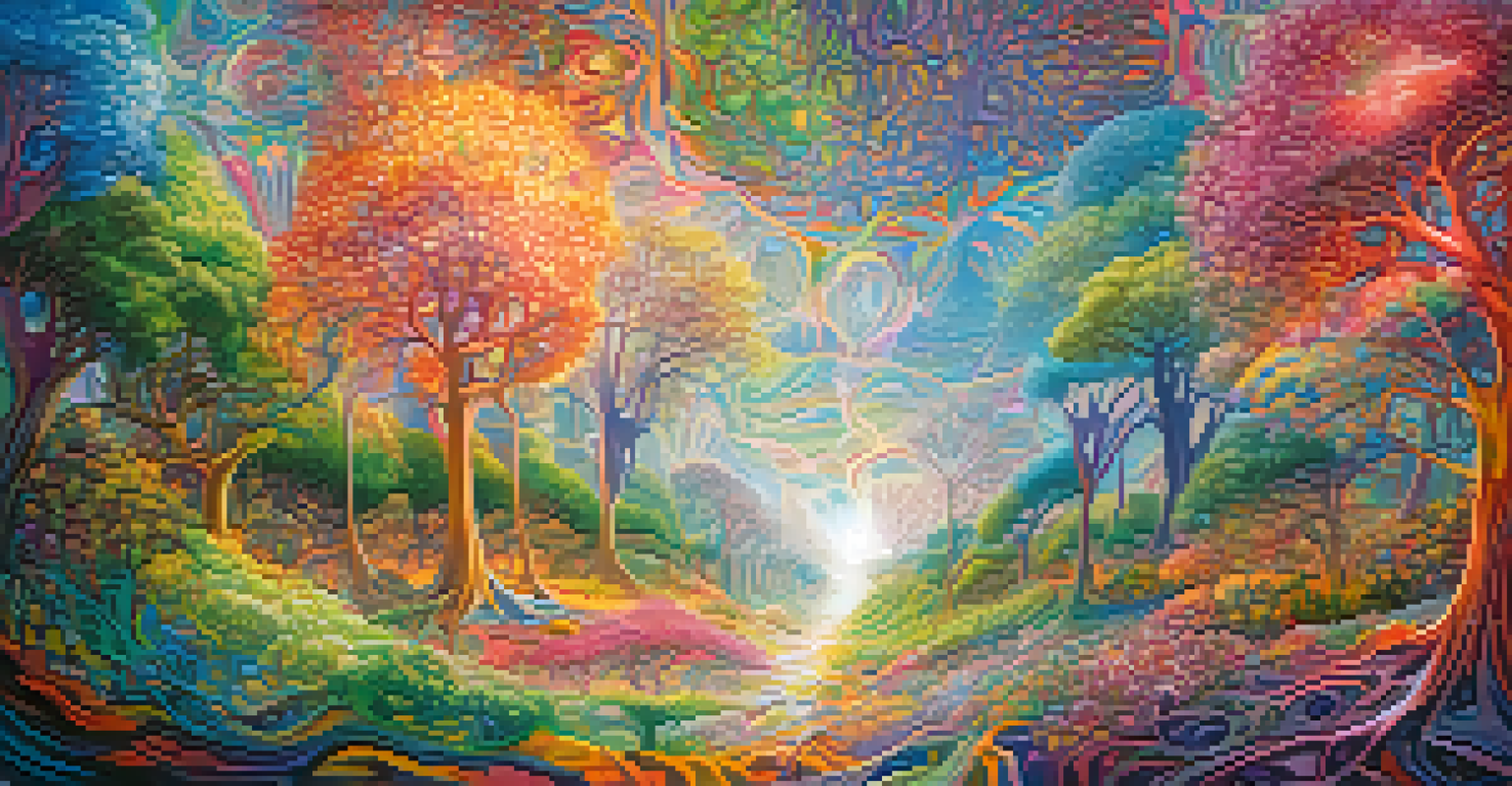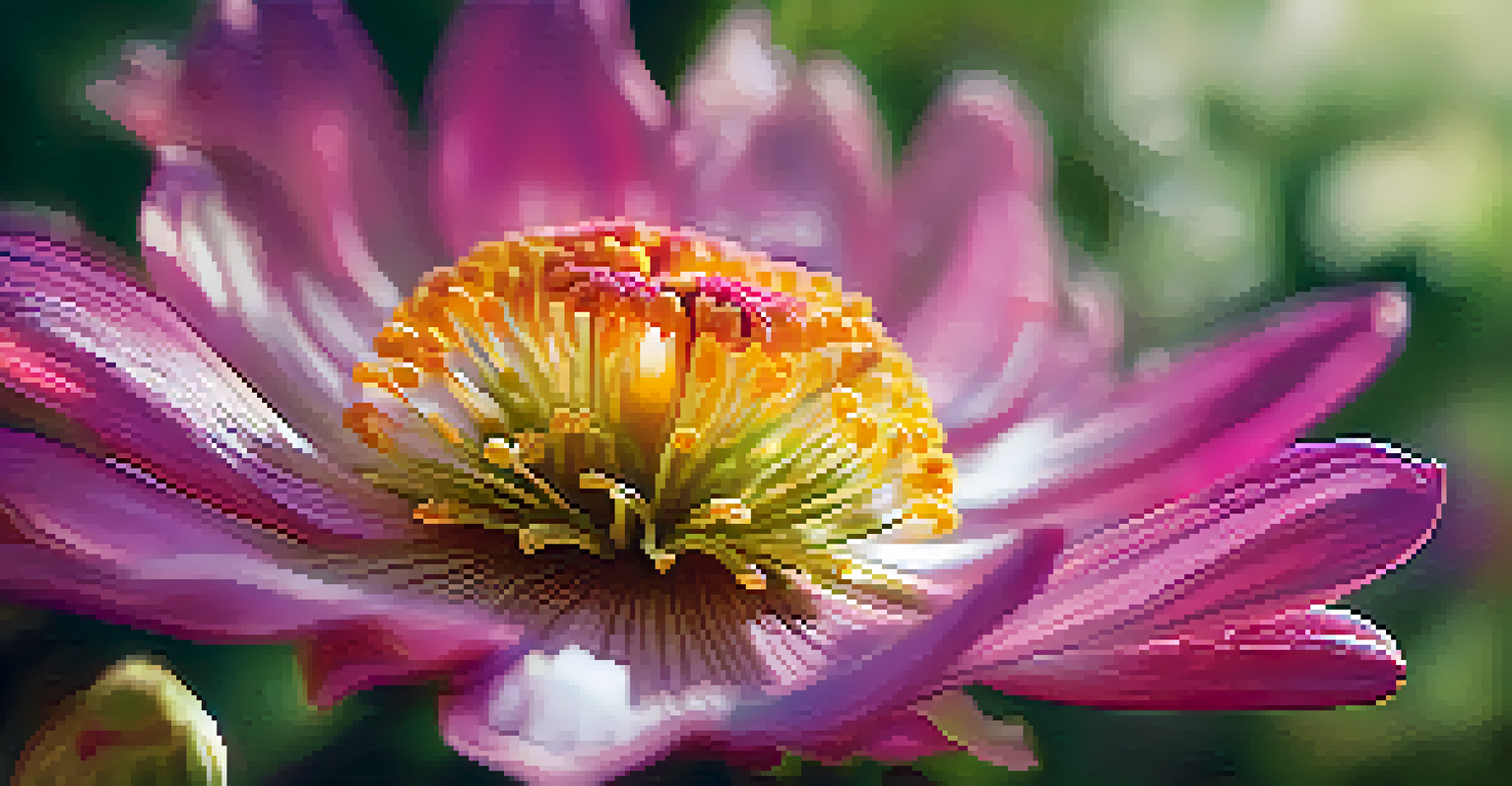Exploring the Connection Between Hallucinogens and Existentialism

Understanding Existentialism: A Brief Overview
Existentialism is a philosophical movement that emphasizes individual freedom, choice, and the search for meaning in an often indifferent universe. Think of it as a lens through which we can examine our existence, questioning why we are here and what our purpose is. This philosophy encourages deep introspection, asking us to confront our own existence and the absurdity that sometimes accompanies it.
Man is condemned to be free; because once thrown into the world, he is responsible for everything he does.
At its core, existentialism grapples with the idea that we are responsible for creating our own meaning in life. It can be liberating yet daunting, much like standing at the edge of a vast ocean, contemplating how to navigate its depths. This exploration of existence ties significantly into how we perceive reality, a theme that becomes particularly intriguing when we consider the role of hallucinogens.
By examining existentialism, we set the stage to explore how certain substances can alter our perceptions and, consequently, our understanding of existence. The interplay between these two concepts can lead to profound insights and experiences that challenge conventional ways of thinking.
What Are Hallucinogens and Their Effects?
Hallucinogens are a class of substances that alter perception, mood, and various cognitive processes. Common examples include LSD, psilocybin (magic mushrooms), and mescaline. These substances can induce experiences that feel profoundly real, leading users to perceive things differently than they do in their everyday lives.

When someone consumes hallucinogens, they may experience vivid visual and auditory hallucinations, altered sense of time, and even feelings of unity with the universe. Imagine looking at a flower and suddenly perceiving it as a vibrant explosion of colors—this heightened awareness can lead to a deeper connection with one's surroundings. It’s as though the veil of ordinary perception is lifted, allowing a glimpse into a more profound reality.
Existentialism Explores Meaning
Existentialism emphasizes the individual's responsibility to create meaning in life, prompting deep introspection about existence.
These altered states of consciousness also encourage users to confront their thoughts and feelings more honestly. This confrontation can lead to significant existential revelations, prompting individuals to rethink their beliefs about life, death, and everything in between.
The Historical Context of Hallucinogens and Philosophy
Throughout history, many cultures have used hallucinogens in spiritual and philosophical contexts. From ancient shamanic rituals to modern psychedelic therapy, these substances have often been seen as gateways to deeper understanding. They serve as tools for exploring the mind and the universe, often leading to profound insights about existence.
Psychedelics can be a catalyst for creativity, insight, and deep personal transformation.
Philosophers like Aldous Huxley and Timothy Leary have explored the connections between psychedelics and human consciousness. Huxley famously described his experiences with mescaline in 'The Doors of Perception,' where he articulated how the substance allowed him to see the world in a new light. This historical context illustrates that the pursuit of self-awareness and understanding has long been intertwined with the use of hallucinogens.
Recognizing this historical backdrop enriches our understanding of how these substances can facilitate existential thought. Just as ancient seekers turned to psychedelics for wisdom, modern individuals may find similar insights through their own explorations.
Hallucinogens: Catalysts for Existential Inquiry
Many users report that hallucinogenic experiences can provoke deep existential questions. These substances can strip away the noise of daily life, allowing individuals to focus on fundamental aspects of existence, such as identity, purpose, and mortality. It’s akin to peeling back the layers of an onion to reveal the core of who we are.
During a hallucinogenic trip, individuals might confront their fears, desires, and beliefs in ways they never thought possible. This confrontation can lead to a sense of clarity about one’s life choices and the nature of reality itself. For some, the experience feels like a journey through their own consciousness, where they can explore the very essence of being.
Hallucinogens Alter Perception
Hallucinogens can significantly change perception and mood, leading to profound insights and a deeper understanding of reality.
As a result, hallucinogens can serve as a springboard for existential inquiry, inspiring individuals to ponder life’s big questions. The insights gained during these experiences can be transformative, prompting a reevaluation of one’s values and priorities.
The Science Behind Hallucinogens and the Brain
Research into the effects of hallucinogens reveals intriguing insights about how these substances interact with the brain. They primarily affect serotonin receptors, which play a crucial role in mood, perception, and cognition. This biochemical interaction can lead to the profound experiences associated with psychedelics, creating a sense of interconnectedness and altered reality.
Functional MRI studies show that hallucinogens can increase communication between different brain regions, leading to a more integrated experience of consciousness. It's as if the brain’s usual pathways are bypassed, allowing for new connections and insights to emerge. This neural flexibility is thought to be responsible for the enhanced creativity and profound realizations reported by users.
Understanding the science behind these experiences adds a layer of depth to our exploration of existentialism. By examining the brain's response to hallucinogens, we can better appreciate how these substances facilitate a richer understanding of existence and consciousness.
Existential Insights Gained from Hallucinogenic Experiences
Many individuals who have experimented with hallucinogens report significant existential insights. These experiences often lead to a renewed appreciation for life, a greater understanding of interconnectedness, and a diminished fear of death. Imagine standing on a mountain peak, feeling a sense of unity with the world around you—this is how many describe their transformative realizations.
Participants in studies have recounted feelings of profound love and connection to all living things, which can shift their perspective on life. This newfound understanding can encourage individuals to prioritize relationships, pursue passion projects, and embrace the present moment. It’s as if the experience serves as a reminder of what truly matters in life.
Balance Risks and Benefits
While hallucinogens can offer enlightening experiences, they also carry risks that require mindfulness and a supportive environment.
However, it’s essential to approach these experiences with caution and respect, as they can also bring up difficult emotions. The insights gained can be powerful tools for personal growth, leading to a deeper understanding of oneself and one's place in the universe.
The Balance: Risks and Benefits of Hallucinogens
While hallucinogens can offer profound existential insights, they also come with risks. Not everyone experiences positive effects, and some may encounter challenging emotions or distorted perceptions that can be overwhelming. It’s crucial to approach these substances with mindfulness and ideally in a safe, supportive environment.
The potential for psychological distress or triggering underlying mental health issues is real, making it essential to weigh the benefits against the risks. Just as a rollercoaster ride can offer thrilling views and excitement, it can also induce fear and anxiety. Being aware of one’s mental state and environment is vital for a beneficial experience.

Ultimately, the journey with hallucinogens can be both enlightening and challenging. By fostering a respectful understanding of these substances, individuals can navigate their experiences more effectively, aiming for the insights that can enhance their existential journey.